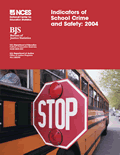Character Education: Necessary for a Safe School Environment?

The 19 indicators of School Crime and Safety are:
- Violent Deaths At School And Away From School
- Incidence Of Victimization At School And Away From School
- Prevalence Of Victimization At School
- Threats And Injuries With Weapons On School Property
- Physical Fights On School Property And Anywhere
- Bullying At School
- Violent And Other Incidents At Public Schools And Those Reported To The Police
- Serious Disciplinary Actions Taken By Public Schools
- Nonfatal Teacher Victimization At School
- Teachers Threatened With Injury Or Attacked By Students
- Students Carrying Weapons On School Property And Anywhere
- Students' Perceptions Of Personal Safety At School And Away From School
- Students' Reports Of Avoiding Places In School
- Students' Reports Of Being Called Hate-Related Words And Seeing Hate-Related Graffiti
- Students' Reports Of Gangs At School
- Discipline Problems Reported By Public Schools
- Students' Use Of Alcohol On School Property And Anywhere
- Students' Use Of Marijuana On School Property And Anywhere
- Students' Reports Of Drug Availability On School Property
To counteract incidents of school violence, we must be compelled to action. The Eleven Principles of Effective Character Education can serve as the underlying criteria to develop or evaluate a character education program to combat the aforementioned 19 indicators. The 11 basic principles as defined by the Character Education Partnership (CEP) are:
Principle 1 Promotes core ethical values as the basis of good character.
Principle 2 Defines "character" comprehensively to include thinking, feeling, and behavior.
Principle 3 Uses a comprehensive, intentional, proactive, and effective approach to character development.
 Principle 4
Creates a caring school community.
Principle 4
Creates a caring school community.
Principle 5 Provides students with opportunities for moral action.
Principle 6 Includes a meaningful and challenging academic curriculum that respects all learners, develops their character, and helps them to succeed.
Principle 7 Strives to foster students self motivation.
Principle 8 Engages the school staff as a learning and moral community that shares responsibility for character education and attempts to adhere to the same core values that guide the education of students.
Principle 9 Fosters shared moral leadership and long range support of the character education initiative.
Principle 10 Engages families and community members as partners in the character-building effort.
Principle 11 Evaluates the character of the school, the school staff's functioning as character educators, and the extent to which students manifest good character.
Working together, we can create an environment that is safe and appropriate for educating good citizens.
Click here to read CEP’s Eleven Principles of Effective Character Education.
Labels: Character, Education, School Violence




0 Comments:
Post a Comment
<< Home